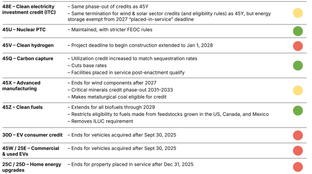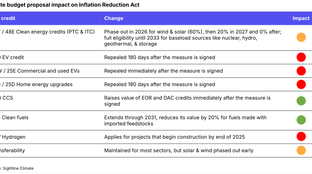
🌎 Bright spots and sunsets in the OBBB #253
One Big Beautiful Bill ushers in new (and old) energy agenda
Highlighting Biden's top picks for climate and the Collaborative Fund
Happy Monday!
In today’s issue, we introduce Biden’s top picks for his pro-climate transition teams and agency frontrunners. We also sit down with Craig Shapiro of Collaborative Fund, who shares his “Villain Test” for evaluating really big ideas and helps us understand how Collaborative invests in climate tech.
This week’s deals include more electric scooters, meat alternatives, and some interesting energy optimizers, as well as some interesting news from Japan, and EVs, and a fresh climate report from The Engine.
Thanks for reading!
Not a subscriber yet?
Personnel is policy. As President Trump continues to scorch the ground of any elected official who believes in science, President-elect Biden is packing his transition teams with expert climate scientists and financial professionals. So far, they’re following the facts – and the money.
Agency Review Teams: These folks are like the PMO management consultants hired during an M&A activity to ensure a smooth transition. Of the 39 agency review teams, at least 19 have one or more officials with some climate background, including:
⚡Energy: Arun Majumdar – initial director of ARPA-E
🗻Interior: Maggie Thomas – climate adviser to Warren and Inslee who proposed ending the Interior’s fossil leases
🚧EPA: Mary Nichols – air quality champion and head of CA Air Resources Board
Potential Cabinet Picks: Frontrunners include diverse candidates with a strong environmental track records, such as:
⚡️Energy: Jay Inslee – Governor of Washington who seeks to close US coal plants by 2030 and reach net-zero emissions by 2045
🌾Agriculture: Amy Klobuchar – Minnesota senator who advocates for greater funding for farmers who adopt environmentally-friendly practices
🗻Interior: Steve Bullock – Governor of Montana who has actively supported public lands and endangered species protections
💰Fed: Lael Brainard – former Treasury undersecretary who urges the Fed to focus on climate and its economic impact
Biden ran on a promise of embedding climate action across the government, and he has shown an openness to the climate community’s advice and big dreams. Suggestions have been pouring in from climate pundits to climate scientists. A team of former Obama administration officials even put together a 300-page blueprint as part of the Climate 21 Project, detailing transition recommendations for climate action.
The Administration won’t be short of climate content or competency. As David Leondhardt wrote in the NYTimes, “Mr. Biden seems to grasp that his success in fighting climate change will go a long way toward defining his success as president.”
🛴 Tier, a Berlin, Germany-based electric scooter startup, raised $250m in Series C funding from SoftBank Vision Fund, Mubadala Capital, Northzone, Goodwater Capital, and others. TechCrunch has more here.
🌱 Kate Farms, a Santa Barbara, CA-based producer of plant-based nutrition, raised $51m in Series B funding from Goldman Sachs, Kaiser Permanente Ventures, and existing individual ventures. More here.
🚗 Envoy Technologies, a Los Angeles, CA-based platform for community-based shared EVs, raised $11m in Series A funding from Shell Ventures and Building Ventures. More here.
☀️ Sundrive Solar, a Sydney, Australia-based solar cell development startup, raised $8m in Series A funding from Blackbird Ventures, Grok Ventures and Australian Renewable Energy Agency. More here.
🍳 Zero Egg, a San Francisco, CA-based maker of a plant-based egg alternative, raised $5m in Series A funding from Powerplant Ventures, Unovis Asset Management, and New Crop Capital. More here.
🥩 Zikooin, a South Korea-based provider of meat alternatives, raised $4m in Series A funding from mostly US venture firms. FT has more here.
⚡ Heila Technologies, a Somerville, MA-based modular energy platform which connects and optimizes distributed energy resources, raised $2.5m in Seed funding from Table Rock Infrastructure Partners, MassCEC, and other individuals. More here.
⚡ Nuuve, a San Diego, CA-based developer of electric vehicle-to-grid projects, agreed to go public via a reverse merger with Newborn Acquisition Corp. More here.

This week we chatted with Craig Shapiro of Collaborative Fund about his journey into venture and focus on climate. Collaborative Fund was started in 2010 to invest at the intersection of for-profit and for-good and thematically seeks to fund founders in climate, money, food & agriculture, kids, and health. Their climate investments include Dandelion Energy, Impossible Foods, Quaise Energy, Modern Meadow, and Zitara, among others. [We’re edited the newsletter version lightly for length; visit our website for the full feature].
How did you first get started in venture capital?
I graduated college in 1999 as the internet was really coming alive. It was the go-go years for the dotcom boom, so I moved out to San Francisco to join some friends working on web and mobile development. That business was acquired in early 2006.
Around that time I started investing. At first it was small angel investments as a means to learn and expand my network. The angel ecosystem was so different from today where early stage investing is so robust with a flood of early stage VCs. For a few years I invested while working with several businesses including GOOD Magazine, a fledgling media company focused on social impact.
Those interests of angel investing and social impact converged, and I decided to launch a fund a little over a decade ago. With the encouragement and support from a few mentors, I raised some money, invested my own capital, and started Collaborative Fund.
What is Collaborative Fund’s investment thesis and mission?
We aspire to be the leading source of capital for entrepreneurs pushing the world forward. That's kind of our true north and born out of something that’s personal to me.
I took a step back and asked myself, what's the best way to catalyze change? Money. But I felt like the world was bifurcated into two big pools: the nonprofits like Red Cross, and the for profits like Coca Cola - with capital sources only aligned to one side. But the capital markets hadn’t evolved in parallel - foundations and private equity sat on opposing sides of the spectrum. So I thought there was a big opportunity at the intersection of those two.
You’ve spoken elsewhere about “Villain Test” – mind explaining?
The Villain Test is a very provocative way of calling out human nature for being self interested. Humans are hardwired to make decisions based, in part, on their own self interest - if you ignore that fact, it’s difficult to generate returns.
Here’s the question framework I use when looking at a new business: If this business goes on to be massively successful, will it improve people's lives? If yes, would a villain buy the product? If you can positively answer both of those questions then you're on to a massive addressable market, fueled by the desire to satisfy both the broader interest and our self interest.
Let’s use cars as an example. The devil on your shoulder wants the Ferrari - it's fast, bold, and sexy. The angel on your other shoulder wants the Toyota Prius - it saves gas and is better for the environment. So consumers vacillate between sacrificing speed and sexiness to feel like they’re doing good, and few are satisfied with that sacrifice. Of course, we then saw Tesla unlock massive returns by satisfying both the angel and the devil’s needs. An electric-powered Tesla doesn't ask you to sacrifice design or speed, and it's got all of the sexiness of the Ferrari with all of the positivity of the Prius.
Why is Collaborative Fund investing in climate tech? Why do you find this an interesting space?
Not to overdo it, but I think climate tech passes the Villain Test. A lot of people talk about how the next trillion dollar opportunity will be in climate tech. As a species we need to solve for this, and in the process of doing so there's going to be opportunity to generate great returns.
We at Collaborative are also a bit contrarian in that we look for fringe areas to invest. In a sense we are a startup ourselves, so we’ve got the underdog hustle to be opportunistic. I think back to when we first started investing in food, which was an area that most traditional VCs wouldn’t touch, and made a big bet on Beyond Meat. Today, there’s a similar opportunity in climate tech partially because the Cleantech 1.0 bust has caused a lot of firms to take a wait and see approach.
What are some verticals within climate tech that you find most interesting? What’s your framework for exploring this space?
For me, food was kind of a gateway drug into climate investing. It's something that’s personal and we all do multiple times a day, which made it a more digestible investment area (if you will). After, everything else seemed to fall like dominoes. Questioning started to send me deeper into food and agriculture, so it wasn't just Beyond Meat or Impossible Foods anymore, but rather the whole agricultural supply chain from what tools farms use, to the actual soil, which led us to our investment in Kula Bio.
Climate tech investing today reminds me of early stage investing circa 2010 back when I started Collaborative: the collaborative nature of a small, mission-driven ecosystem. Traditional software investing right now is so competitive, there's so much money flowing in that firms are elbowing each other out of deals. It’s the opposite in climate. In almost every single climate deal we look at, other funds are actively looking to co-invest. They're like, let's call our friends at Prime Impact or The Engine or Breakthrough if it’s really risky. Because it’s more collaborative, firms can start to rely on the strengths and weaknesses of the syndicate. So, if The Engine has somebody on their team with a PhD in this area we can work with them to get more comfortable with the more technical questions.
Climate tech investing is growing 5x faster than venture as a whole. What needs to be true for generalist investors to gain more confidence investing in this space?
I hate to sound transactional, but I think so much is based on returns. The run up of Tesla's stock really matters. It’s certainly caught the attention of a whole bunch of generalist funds - just look at the EV craze. It’s like how Beyond Meat’s IPO unlocked a rush into plant based food, and investors are like, well, we'll take a look at that plant based chicken. Really, really powerful companies unlock more capital from generalist funds, but domain-focused funds are going to need to lead the way.
Are LPs setting guidelines around impact measurement or reporting?
I think of this evolution in phases. The first phase was the divestment stage where investors set guidelines around what we should not be investing in. That was a much easier conversation. The second phase, where we’re at right now, is fact finding. Everyone wants help getting smarter around industries and materiality. The future third phase will be clear guidelines around reporting and defining where we want to invest - but the industry is a ways off from that.
As a firm, we’re asking ourselves what we’re trying to quantify? A helpful guidepost could be to set a standard like measuring sticks from other industries like Fair Trade, LEED, B Corp. Otherwise, you get into a challenge where the word ‘good’ means different things to different people.
A play-by-play of down-ballot races (e.g., mayoral electees) and ballot-measures (e.g., oil production taxes) that could have major local-level climate impacts.
Putin orders Russia to work toward Paris climate goals, but with the large caveat that action must be balanced with economic development.
The UK is the first country to mandate TCFD-aligned disclosure as investors rally for uniform ESG standards.
A first for the US Federal Reserve, the central bank pointed to the risks that climate change will pose to asset valuation in their biannual financial stability report. The report said, “Climate change adds a layer of economic uncertainty and risk that we have only begun to incorporate into our analysis of financial stability.”
BP and Orsted will jointly develop a green hydrogen facility to produce green hydrogen from wind energy generated off the coast of Germany.
Linde Engineering has teamed up with Evonik Industries to offer a fully integrated solution to deliver hydrogen via natural gas pipelines.
Japan doubles down on Hydrogen to replace oil as part of the country’s push towards pledged carbon neutrality.
While China and the US have been at odds for years and throughout Trump’s presidency, Chinese environmentalist Ma Jun believes Biden’s climate forwardness could yield collaboration between the world’s two largest economies and largest emitters.
San Francisco will ban natural gas in new buildings, which accounts for ~40% of overall emissions and 80% of building emissions.
The Engine’s thoughtful summary of the state of climate tech’s “come back” and the driving forces behind as part of an epic 82 page issue.
Our friends at Contrarian Ventures put together a slick technology market map of grid inspection startups.
“Climate change is making it more likely for storms to behave in certain ways,” and it’s important to understand how and why.
Americans are defying climate migration patterns seen elsewhere in the world – flocking to cities at risk of severe climate impacts, including Miami and Phoenix.
What’s better? Planting trees or letting forest naturally regrow?
A Foreign Policy magazine primer on the many things presidents can do for climate without Congress.
In September 2020, for the first time in history, new vehicle registrations in Europe for electrified vehicles overtook diesel.
Rivian has released its Electric Adventure Vehicles which allow you to configure color, interior, battery range, wheels and tires, and even add a camp kitchen.
ICYMI Shell’s pathetic attempt to shirk responsibility for the climate crisis… on Twitter.
4 of Scientific American’s Top 10 Emerging Technologies of 2020 are climate technologies: photocatalysts for carbon to value, electric aviation, low carbon cement, and green hydrogen.
Per last week’s feature, Carbon 180 has estimated that the total ‘carbontech’ market size for carbon to value companies could be $1t annually in the US and $6t globally.
‘I am Greta’ – a documentary about climate warrior Greta Thunberg – was released on Friday.
💡 NYSERDA launched NY Climate Progress, a $10m investment program to support climate tech companies Building Back Better. The program invests up to $500k per company in a convertible note.
💡 ARPA-E released new funding for disruptive energy technology small businesses. Apply to “Supporting Entrepreneurial Energy Discoveries” (SEED) before January.
🗓️ 11/18 DERMS Panel with Young Professionals in Energy: Tune in to the first collaborative event with YPE and the DER Task Force on the future of distributed energy resources including speakers from Blueprint Power and Opus One.
🗓️ 12/1 Green City Force: Support GCF’s Thanksgiving Celebration on ‘Giving Tuesday’ as the workforce development non-profit works towards a “green city” by supporting young adults from frontline communities. Click here to RSVP.
🗓️ 12/1 Petri Founder Speaker Series: Join Adam Behrens as he shares a crossroads decision he had to make in Mori's early days - and how it played out over time.
Director of Measurement and Impact @Climate Neutral
Strategic Partnerships Manager @Beyond Meat
SVP, Market Transformation @LA Cleantech Incubator (LACI)
VP of Engineering @David Energy
Director of Pricing and Risk Management @David Energy
Sr Associate @Obvious Ventures
Director of Marketing @Square Roots
Chief of Staff @Impossible Foods
PM Internship @Google X
Various jobs in the Biden Administration @Clean Energy for Biden
Feel free to send us new ideas, recent fundings, or general curiosities. Have a great week ahead!

One Big Beautiful Bill ushers in new (and old) energy agenda

Climate, capital, and carrots in London's new playbook

US plays popcorn politics with biofuels and beyond